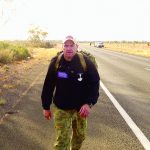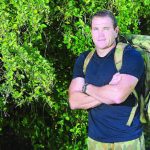Ballarat’s suicide crisis; the way forward
For too long suicide has been a social taboo; often swept and the carpet and not discussed. However, there is a growing movement for change in Ballarat.
Reporter Olivia Shying explores the issue in depth.

We need to change our thinking: John Shanahan and granddaughter Harriette Preston, 7, with a photograph of Nathan. Picture: Luka Kauzlaric.
John Shanahan is a grieving man, but he is also a man on a mission. He watched his devoted, beloved son fight demons so strong that he woke up screaming in the night, wrapped in sweat-soaked sheets.
In the days before Christmas the mental demons became too much for Nathan Shanahan and he took his own life. The hoops those experiencing mental illness have to jump through to get support can be lethal, John says.

Nathan Shanahan
Every time Nathan, a firefighter and retired soldier, had to fill out forms for mental health support he was re-traumatised and found the process very difficult.
“As a father I want to make sure this doesn’t happen to anyone else. If I can save one family, I am going to make a difference,” John said.
John Bale, founder of military support group Soldier On, said “the layers of red tape a veteran must go through to seek support” remained a key problem for veterans seeking support.
“Soldier On identified one of the biggest stresses a veteran can face is the process of transitioning from the Defence Force to civilian life.
“Statistics released by the Australian Government late last year reinforced this when they found that while serving in the Defence Force, the risk of a male taking his own life is 53 percent lower than the national average but once a male leaves the Defence Force the risk sky rockets to 13 percent above the national average.”
John says there were times he took Nathan for treatment and was knocked back. He says this scenario is not acceptable as greater support is required, and he’s campaigning for change. He doesn’t know how long it will take, or if he will be successful –but if he is to honour Nathan’s legacy, then raising awareness and striving for change is the best way to do it.
“There are people out there crying out for help (but at the moment politicians are not doing enough) because it is not a widely accepted community issue and possibly not a vote-winning scenario,” John said.
John is calling for vital support for all military and emergency service workers. He said he now planned to become a passionate advocate for more mental health funding, particularly for PTSD, with one in eight men suffering from anxiety and depression and 72 per cent of males not getting help because of fear of talking.
“This flows onto our firies, paramedics and police officers – they protect our community, and the stress and pressure that they are under can sometimes lead to mental illness,” John said.
“We need to stop dancing around the word ‘suicide’. It is a very real part of life. There needs to be 24-hour accessible help that is easy to get.”
From July 1, Department of Veteran affairs will pay for the treatment of PTSD, depressive disorder, anxiety disorder, alcohol use disorder, and substance use disorder, whatever the cause, for anyone who has served at least one day full time in the Australian Defence Force.
This initiative is fully funded and uncapped, which means if demand is there it will be met. All members and former members of the ADF are also eligible for health care, mental health services, counselling, support and compensation for conditions that are accepted by DVA.
Victorian acting veteran affairs minister Philip Dalidakis said a review of the Victorian Veterans Council’s Sector Study Report would identify ways to provide more effective support and assistance to veterans.
John says mental health services across the state, but especially in Ballarat, need to be better funded and better managed.

Nathan Shanahan’s coffin at his funeral.
BeyondBlue Chairman Jeff Kennett has repeatedly called on politicians to act to assist the “military personnel who have died by their own hand – in Australia”.
“Surely our obligations to those who return, should be, must be that they are safer here, on home soil, than when away.Their private battles must become our cause.”
“Everyone has a bucket…occasionally peoples’ buckets will overflow.”

Ballarat Divisional Mental Health Liaison Officer Senior Sergeant Paul Maslunka
A high ranking police officer is urging all workplaces to consider the mental health of their employees and ensure they have the support services in place to help those who need it.
Emergency workers are routinely exposed to volatile and traumatic situation, but over the past few years Victoria Police and Ambulance Victoria have been committed to addressing the high rate of suicide and mental illness among staff.
Ballarat Divisional Mental Health Liaison Officer Senior Sergeant Paul Maslunka is committed to supporting members by managing their exposure to traumatic events. He is urging other managers to do the same.
“(Managers need to ask) how do I look after the welfare of my people to stop that accumulation into their bucket? It can be a combination of health, finances, injuries, day to day pressures and can build up and create that blowout,” Senior Sergeant Maslunka said.
2016 saw the release of the highly anticipated Victoria Police mental health review. Police chief commissioner Graham Ashton promised to take on all 39 recommendations. At the time, he said there was work to be done – and the police culture was one of the first areas that needed to be addressed.
“We need to build a culture that better understands mental health. A culture in which our employees feel safe to ask for help without fear of judgment or prejudice,” he said.
Senior Sergeant Maslunka said those recommendations are already paving a way for change in the organisations.
”We do recognise that everyone has a bucket, an invisible bucket that you carry round and everything contributes to going into that buckets and occasionally peoples’ buckets will overflow.
Ambulance Victoria has also recognised this through a partnership with Beyond Blue that will see a $3.7 million mental health program rolled out. The rate of suicide among paramedics is four times higher than in the average profession.
Adavanced Life Care Paramedic Adam Phillips said the partnership was evidence that Ambulance Victoria was taking PTSD seriously.
“It is a huge step in the right direction to help paramedics manage the stress of the job,” Mr Phillips said.
CFA operations officers Malcolm Bruce said duty officers contacted peer support officers when members were exposed to fires that resulted in fatalities or traumatic road accidents.
“It’s about speaking to each other and providing support,” he said.
Crisis centre key to ease pain

Kristy Steenhuis
Survivors of Suicide will open up a 24 hour crisis support centre this year, tireless mental health advocate and founder Kristy Steenhuis says.
When Ms Steenhuis lost her husband to suicide at the age of 28, she struggled to find the support she needed to help her through her darkest time.
“When you are looking for support when you are bereaved, it is really hard to know where to start so we thought with establishing a place in town where it is blatantly obvious what we do,” she said.
Determined to help herself and others Ms Steenhuis established Survivors of Suicide (SOS). Since day one, her dream has been to establish a 24 hour drop-in centre where bereaved families or those contemplating suicide could have immediate access to a range of qualified staff.
“The goal is to be able to provide support 24 hours a day, seven days a week for those who have attempted suicide or harm, or for those who have been bereaved,” Ms Steenhuis said.
Planning is well underway and with or without significant state funding Ms Steenhuis will speak to council to try and secure a premises.
“We will have a team of specialists, including psychologists, and will advocate for that person (the client) to help them access other services,” Ms Steenhuis said.
The Gippsland branch of SOS is currently negotiating with its council and has drawn up a business plan and model for the crisis support centre. When these centres open up, Ms Steenhuis believes they will be the first of their kind in the state if not the nation.
“This will be a safe, non-judgemental place where someone can go anytime – at night, which is the darkest time,” Ms Steenhuis said.
“(A crisis centre) is desperately needed with the amount of suicide that we are seeing.”
Ms Steenhuis expects the centre to be operational in around six months.
Suicide remains a serious problem

Michelle MacGillivray
Suicide is a serious problem that has been increasing in this region over the past decade, Lifeline’s Ballarat manager says.
Lifeline Ballarat program manager Michelle MacGillivray is urging residents to start having more open conversations with family, friends and colleagues.
“It’s raising our awareness about when we recognise when somebody may be in distress and working out how to approach them and encourage them to seek help,” Ms MacGillivray said.
Ms MacGillivray said it was particularly important to ensure men reached out to services as traditioanlly they are far less likely to speak out than females.
Lifeline is continuing to invest in new resources and will roll out a text-line this year. Ms MacGillivray said the current online chat model allowed the service to engaged with a different, younger demographic than the traditional phone model.
“We are also looking at programs that build resilience in communities.”
Mental health services available

People with PTSD often experience feelings of panic or extreme fear, similar to the fear they felt during the traumatic event. A person with PTSD experiences four main types of difficulties.
Re-living the traumatic event – The person relives the event through unwanted and recurring memories, often in the form of vivid images and nightmares.
- Being overly alert or wound up
- Avoiding reminders of the event
- Feeling emotionally numb
- It’s not unusual for people with PTSD to experience other mental health problems at the same
DO YOU NEED HELP?
For 24/7 support, contact:
- Lifeline 13 11 14
- beyondblue 1300 224 636
- Defence All Hours Support Line 1800 628 036
- Defence Family Helpline 1800 624 608
- MensLine 1300 789 978
- Veterans and Veterans Families Counselling Service 1800 011 046
- At Ease for serving and ex-serving ADF



